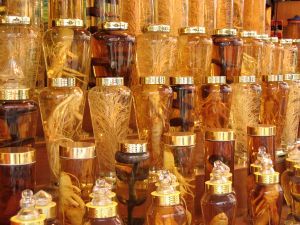Reuters News has reported on medical studies whose findings were reported at the annual meeting of the American Society of Clinical Society. The article, “Flaxseed, ginseng show benefit in cancer treatment” was written by Julie Steenhuysen and published by Reuters News.
Doctors are looking at the effectiveness of alternative treatments that patients often take on their own with little scientific proof that they help. The National Center for Health Statistics states that “Americans spend between $36 and $47 billion a year on complementary and alternative therapies, reports Reuters.
The leader of the panel on alternative therapies at a meeting of the American Society of Clinical Oncology, Dr.Bruce Cheson of Georgetown University Hospital in Washington University in Washington, was quoted by Reuters, “Patients are taking these compounds by we need to know if they are doing any good or any harm.”
The trial on ginseng was conducted by Debra Barton of the Mayo Clinic in Rochester, Minnesota, and colleagues. The researchers tested the herb on patients with a variety of cancers who were expected to live at least six months. They tested three different dosages of the herb.
25% of the patients who took a 1,000 mg dose and 27% of patients taking a 2,00 mg dose said their fatigue symptoms were “moderately better” or “much better”.
Of patients that took a lower dose of 750 mg, only 10% reported an improvement. This was about the same as the placebo group.
The ginseng used in the study was from a single crop of Wisconsin ginseng. The ginseng was tested for uniform potency. The powdered ginseng was given In capsule form.
Dr. Nancy Davidson, an oncologist at Johns Hopkins University in Baltimore, who is the president-elect of ASCO, was quoted by Reuters, “I wouldn’t have predicted this, I have to admit. We might want to test this on a large scale.”
Cancer-related fatigue is one of the most common side effect of scancer and cancer treatment. According to the Cleveland Clinic website, “fatigue is often confused with tiredness. However tiredness happens to everyone. Fatigue is a debilitating daily lack of energy. Fatigue is an excessive whole-body tiredness not relieved by sleep. Fatigue can be acute (lasting a month or less) or chronic (lasting longer than one month or even several months). Fatigue prevents a person from functioning normally, negatively impacting quality of life.
Cancer-related fatigue usually comes on suddenly and is not predictable. It is not a result of activity and is not relieved by rest or sleep. Cancer related fatigue is often described as “paralyzing” and may even continue after treatment.
Cancer treatments that are commonly associated with fatigue include chemotherapy, radiation therapy, bone marrow transplant and biological therapy. Additional factors that may contribute to fatigue include decreased nutrition, cancer treatment that reduces blood counts, slowed metabolism, medications, stress and depression. Patients that try to continue their normal routines may experience fatigue and may have to consider modifying their routines.
“Ginseng refers to several species of the genuine Panax”, according to the Mayo Clinic website. The roots of the slow growing Ginseng plant have long been valued in Chinese medicine The tow most commonly used species are Asian ginseng and American ginseng. American ginseng is .both cultivated in the wild and cultivated.
Scientific evidence of moderate success of ginseng usage is reported on the may Clinic website. Modest benefits have been shown for mental performance and diabetes. There is inconclusive data on ginseng’s effectiveness for other conditions.
The information is not intended as medical advise. If you have a medical condition, consult a physician.
Resources:
today.reuters.com
mayoclinic.com
cleveland clinic.org
